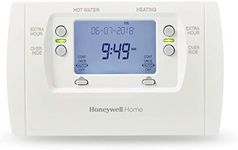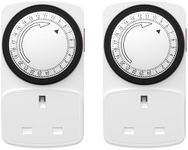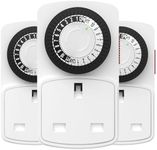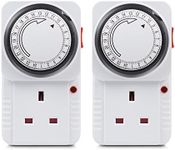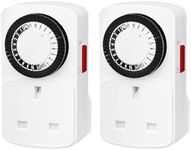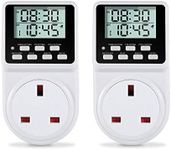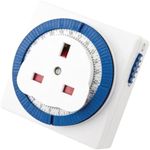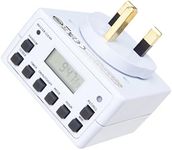Buying Guide for the Best Plug In Timers
Plug-in timers are a convenient way to automate the operation of electrical devices, helping you save energy and enhance security. They allow you to set specific times for devices to turn on or off, which can be particularly useful for lamps, heaters, or any appliance you want to control without manual intervention. When choosing a plug-in timer, consider your specific needs, such as the type of device you want to control, the frequency of use, and the complexity of the timer's programming options.Type of TimerPlug-in timers come in two main types: mechanical and digital. Mechanical timers are simple and often feature a dial that you turn to set the time. They are easy to use and generally less expensive, but they offer limited programming options. Digital timers, on the other hand, provide more flexibility with programmable settings, allowing for multiple on/off cycles and even randomization features for added security. If you need basic functionality, a mechanical timer might suffice, but for more complex scheduling, a digital timer is preferable.
Programming OptionsProgramming options refer to the ability to set specific times for your devices to turn on and off. Basic timers might only allow a single daily cycle, while more advanced models can offer multiple daily cycles, weekly programming, or even randomization features. Consider how often you need your device to operate and whether you need different settings for different days. If you have a consistent schedule, a simple timer with limited programming might be enough, but for varied schedules, look for a timer with more advanced programming capabilities.
Load CapacityLoad capacity indicates the maximum electrical load the timer can handle. This is important to ensure the timer can safely operate the device you intend to use it with. Load capacity is usually measured in amps or watts. Check the power requirements of your device and ensure the timer can support it. For small appliances like lamps, a lower load capacity is sufficient, but for larger devices like heaters, you will need a timer with a higher load capacity.
Ease of UseEase of use is crucial, especially if you're not familiar with programming electronic devices. Mechanical timers are generally straightforward, with a simple dial to set the time. Digital timers can be more complex, with buttons and screens for programming. Look for a timer with clear instructions and intuitive controls. If you're comfortable with technology, a digital timer with more features might be appealing, but if you prefer simplicity, a mechanical timer is likely a better choice.
Size and DesignThe size and design of a plug-in timer can affect where and how you use it. Some timers are bulky and may block adjacent outlets, while others are compact and designed to fit neatly into a power strip or wall socket. Consider where you plan to use the timer and whether space is a concern. If you need to use multiple devices in one area, a compact design is beneficial, but if space is not an issue, you can opt for a larger timer with more features.

